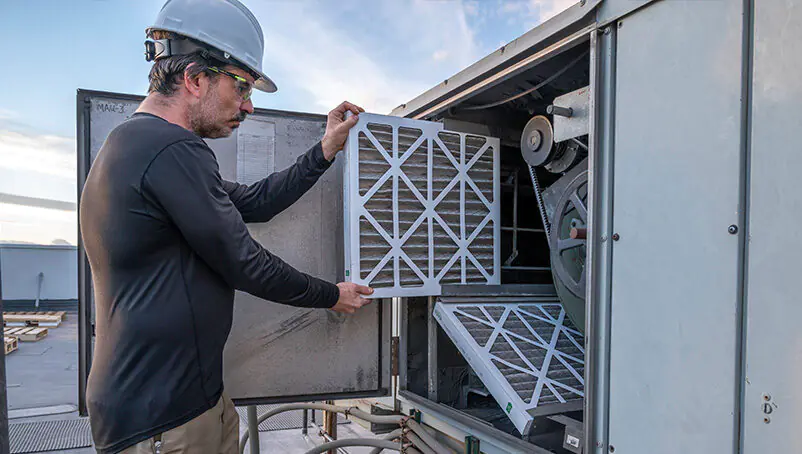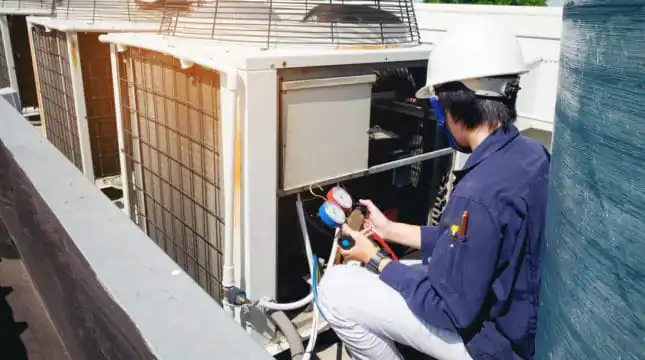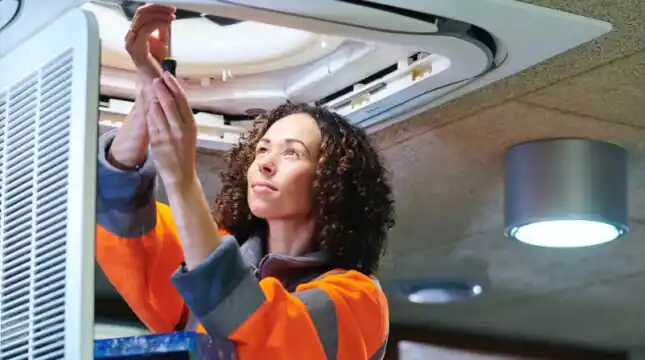Do you need a license to be an HVAC contractor?
All Georgia HVAC servie technicians must have a license. This has been a state law since 1949, and it states that “No person shall engage in the business of conditioned air contracting as a conditioned air contractor unless such person has a valid license from the Division of Conditioned Air Contractors.”
Georgia HVAC license requirements
The following is an overview of the general Georgia HVAC license requirements:
- Four to five years of documented work experience
- Three professional references
- A passing score of at least 70% on the HVAC contractor exam
- Application and licensing examination fees
- Background check
- EPA card/EPA certification
More details on these requirements can be found in this guide.
Georgia HVAC license classifications
The state of Georgia offers two types of HVAC licenses for contractors:
Class I Restricted
The restricted license limits HVAC contractors to working on equipment that does not exceed 175,000 BTU of heating and 60,000 BTU of cooling. You need four years of documented experience for a Class I license.
Class II Non-restricted
HVAC contractors with a Class II license can work on any type of heating and cooling equipment. To qualify for this license classification, you must show five years of work experience that includes installations of conditioned air systems exceeding 175,000 BTU of heating and 60,000 BTU of cooling.
EPA license requirement
When you apply to become a licensed HVAC contractor in Georgia, you’ll also need to show that you have a Type II or higher certification from the Environmental Protection Agency (EPA). This certification demonstrates that you’ve been trained to handle refrigerants properly according to Section 608 of the Clean Air Act.
How to get an HVAC license in Georgia
To get your license, you need to complete three steps.
Step 1: Submit your application
The application includes the following sections:
- Personal information: Include your name, Social Security Number, address, etc.
- Qualifying licensee registration: Indicate whether you will serve as a qualifying licensee for a conditioned air company.
- Experience record: List the details of your past employment.
- References: Provide three notarized reference forms from professionally licensed individuals with knowledge of your work experience.
- Education: Submit proof of your education in the field, such as completion of a certificate program from a vocational/technical school and a copy of your EPA card showing Type II or higher certification.
- Personal history: Answer questions about previous licensings in other states (if applicable) and include a criminal background check.
- Applicant affidavit: Submit a copy of your driver’s license, passport, immigration papers or other related citizenship documents.
In addition to the completed application, you’ll also need to submit a $30 non-refundable application fee. You must also pay a $10 processing fee.
Step 2: Submit a licensing examination scheduling form
If the Georgia Construction Industry Licensing Board approves your application, you can take the HVAC contractor exam. You’ll receive instructions on what to do next, including:
- How to register for the exam
- What to review in preparation for the exam
- How much you’ll need to pay for the exam
Follow these instructions to select your exam day, time and location and submit your exam scheduling form. The exam fees vary based on the type of license you’re pursuing.
Step 3: Pass the exam
You’ll go to a PSI/AMP testing location to take the state licensing exam via computer. If you pass, the Georgia Construction Industry Licensing Board will update your status on their website. If you fail, you’ll receive information on how to retake the exam.
How long does it take to get your HVAC license in Georgia?
After they’re received, most applications are processed within 20 business days, although processing times may vary according to application volume. Incomplete applications take longer, so make sure to include all necessary documents when submitting your application.
Georgia HVAC license reciprocity
Previously, Georgia used to have reciprocity agreements with Louisiana, Texas and South Carolina. Currently, the state licensing board is not accepting reciprocity license applications.
HVAC license renewal requirements
You must renew your Georgia HVAC license every two years to keep it active. To renew your license, you’ll need to:
- Pay the license renewal fee: Currently, the renewal fee is $75.
- Complete continuing education courses: Georgia HVAC contractors must complete at least four hours of continuing education courses per year. You’ll need to provide documentation with your license renewal application.
What kind of insurance does an HVAC need in Georgia?
Consider getting the following types of insurance to help protect your HVAC business.
Workers’ Compensation insurance
All Georgia HVAC business owners with three or more employees must have workers’ compensation insurance. If you or one of your HVAC technicians gets hurt on the job, this insurance can help provide wage protection and other benefits.
General Liability insurance
General liability insurance can help provide coverage if someone other than an employee claims that your company’s actions caused them injury or property damage.
Tools and Equipment insurance
Tools and equipment insurance can help provide repair and replacement coverage for damaged or stolen work gear.
Commercial Auto insurance
Commercial auto insurance can help cover costs related to auto accidents, such as property damage and medical expenses.
In Georgia, drivers must have liability insurance that meets the minimum limits required by law:
- $25,000 per person for bodily injury
- $50,000 per incident for bodily injury
- $25,000 per incident for property damage
Commercial Property insurance
Commercial property insurance can help provide coverage for certain causes of physical damage to property you own or rent.
How NEXT supports Georgia HVAC contractors
At NEXT, we specialize in small business insurance for HVAC contractors and can put together a custom package based on your unique needs.
With our online service, it’s easy to apply for coverage and get a certificate of insurance in just minutes. We also offer an unlimited number of digital certificates at no extra charge.
NEXT offers convenient and affordable service whenever you need it. We’re available to help, and you can get things done quickly and efficiently with your easy-to-use online account.
Get an instant quote online today to take the next step in your HVAC career.
Looking for more information on what states require HVAC licenses? Check out our summary of HVAC contractor license requirements across the U.S.
This information has been provided as a service. It is correct and up-to-date to the best of our knowledge; however, it is in no way intended to offer legal advice and you must always consult with local authorities before you make any business decisions. Regulations and requirements may change at any time.






